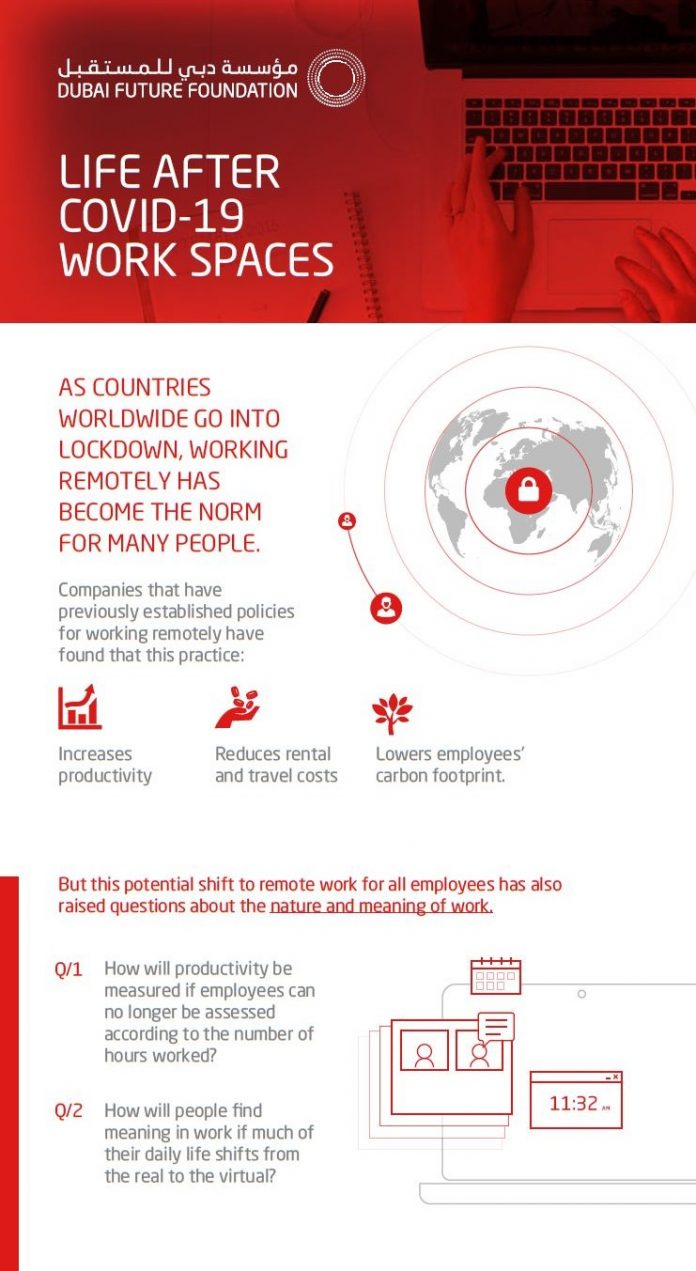
The Dubai Future Foundation launched the first issue from a series of reports to tackle the different challenges that organisations in Dubai and the world will face once the COVID-19 global outbreak subsides, titled “Life After COVID-19: Workspaces”.
The report, launched today, looks into the future of work post the novel coronavirus, the notion of social distancing and what regulatory implications and work models arise from working remotely. The report further discusses the impact of this on productivity, rental and travel costs and the carbon footprint of employees.
Khalfan Belhoul, CEO of Dubai Future Foundation, said, “The output from this report will be used to draw a clearer outlook of Dubai’s future in the coming period and deep dives into the future of work, looking into the necessary policies and regulations that need to be implemented to ensure business continuity, and proposes new work models that can potentially be exported globally.”
The inaugural report focuses on the growing trend of working remotely – it is set to be the new norm for the foreseeable future, with employers developing more flexible ways to conduct work.
Abdulaziz Al Jaziri, Deputy CEO and COO of Dubai Future Foundation, said, “The shift imposed by the current changes towards working remotely raises many questions on the meaning and nature of work, one of which is whether there is an actual need for a physical workspace, the nature of employee relationships, how HR adapts whilst ensuring employees’ productivity and happiness, and finally, the potential widespread of events and seminars going digital.”
He added, “The Dubai Future Foundation is working on hosting virtual dialogues discussing what the future holds post-COVID-19, providing an opportunity for all members of the society, as well as experts to share their views, ideas and recommendations.”
Working remotely has typically been common in certain sectors, such as IT, marketing, application development and some forms of retail.
A study done by Global Workplace Analytics found that remote workers have grown by 140 percent since 2005. Owl Labs, a leader in immersive video conferencing technology, reported that 16 percent of global companies are exclusively hiring for remote job opportunities. By 2028, a study by UpWork, a work-from-home platform, estimates that 73 percent of departments will have remote workers.
In the short term, the reports find that HR policies will need to adapt to the current situation, focusing on employee happiness and productivity. In the longer term, employers will need to consider whether working remotely may be beneficial for employees and whether jobs can be automated or digitised to allow for more multi-disciplinary work.
Additionally, the report introduces several short- and long-term recommendations. A short-term recommendation (during the COVID-19 outbreak) involves introducing a well-being model, such as happiness indices and activities to promote social interaction. These could take the form of digital community events and will become prevalent in HR policies to ensure employees remain mentally healthy while working from home. Productivity will be measured through outputs rather than inputs, with employees managing their own time, instead of being subject to mechanisms that monitor hours or visibility.
In the long term, working remotely may become an integral part of business models post-COVID-19, with entities maintaining a remote working structure, except for meetings that must be held face-to-face. Large events, seminars and workshops will go digital, with virtual and augmented reality used to create “real-life” inclusive experiences.
With automation increasing rapidly, employees will also need to diversify their skills or use their existing skills for other jobs.


































